Horses are built to run—more specifically, to run away from danger. It is their natural flight instinct that makes them hyperaware of their surroundings and ready, if necessary, to escape predators. However, humans have domesticated horses and placed them in a living environment and daily routine that hardly resembles what nature intended. This has inevitably changed the way horses respond to stressful situations because they cannot simply run away. Living part of their lives in a stall, relying on humans for most of their nutrition and working as riding or competition horses have also introduced stress factors that horses in the wild never experience.
“Stress is always about management and consistency. Compare what a horse would be doing in the wild. It would be in a herd, walking and grazing, and it would be slim pickings—no buckets of concentrated horse feed,” says Ted Wright, DVM, of Cedar Ridge Animal Hospital & Equine Services. “Everything we do with them is a little unnatural. The closest we can get to natural has the potential to decrease the stress we’ve imposed on them.”
Stress is not simply a feeling or a response to the environment. There is a process happening inside the body that can lead to chronic problems if left unchecked. When a horse is stressed, the body releases the hormone cortisol. Often referred to as “the stress hormone,” cortisol is produced by the adrenal glands and found in saliva and blood. Cortisol receptors are located in most cells and function to receive cortisol and use it in various positive ways, such as regulating metabolism, maintaining electrolyte balance and reducing inflammation. Cortisol is important for the healthy function of many of the body’s metabolic and immunologic processes, but an unbalanced level of cortisol can lead to serious health issues.
“[Too much] cortisol weakens the body’s natural defenses. It suppresses the immune system, so stressed horses are more prone to catch something from a neighboring horse or succumb to commensal [bacterial] diseases like rain rot and thrush,” Dr. Wright says. “You can’t always see outward signs, but internally this is what’s happening. That’s why some stressed horses fail to thrive. Any way we can restore comfort in them at a more consistent environment or schedule will reduce stress and make them more healthy.”
Signs of Stress
Horses will show signs of stress in various ways. Short-term (acute) effects of stress that go untreated may lead to more serious long-term (chronic) problems. Here are just a few of the many signs of stress. Every animal will display stress differently. Know what is normal for your horse so you can identify sudden changes in personality, behavior and habits.
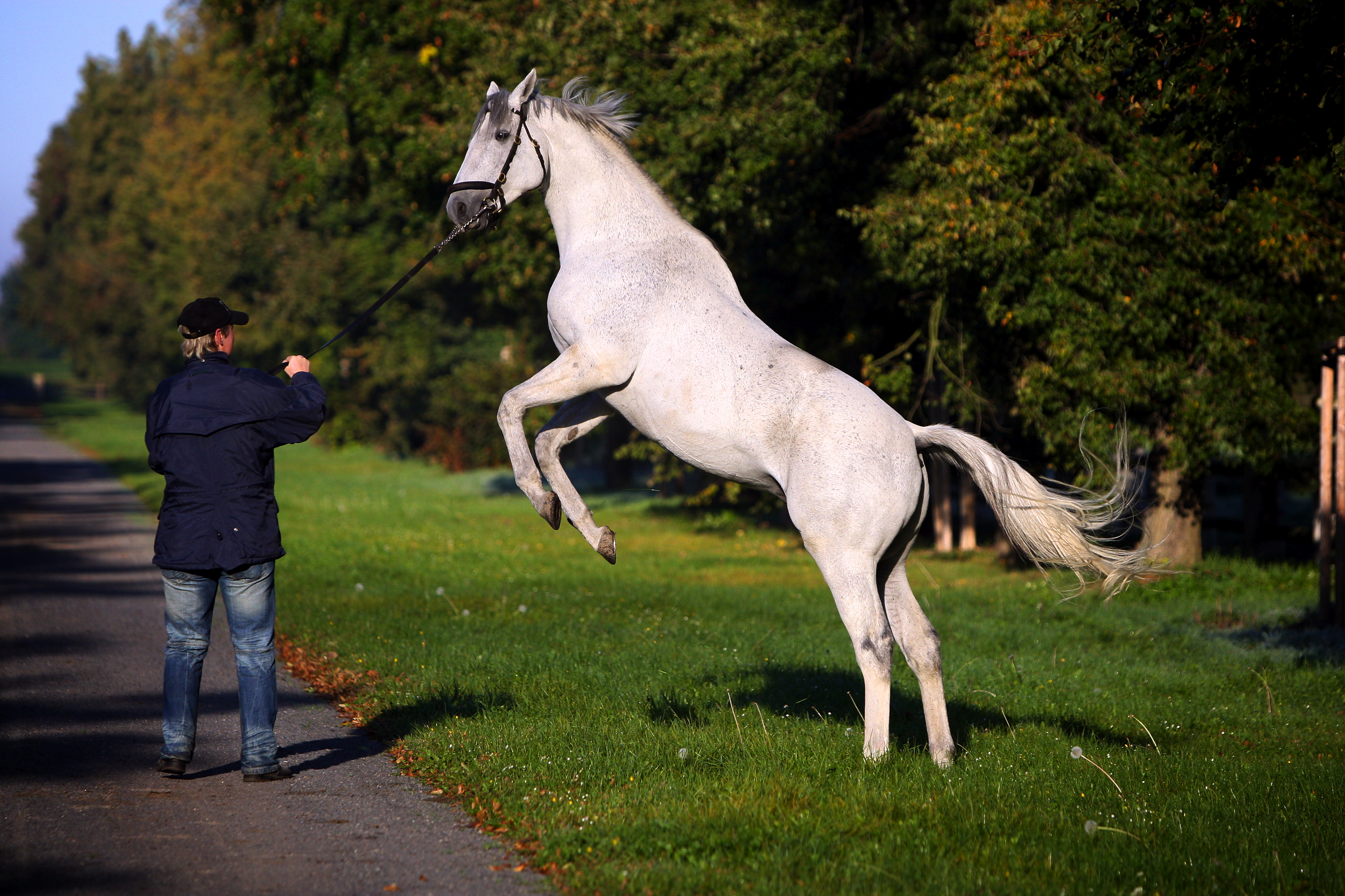
Acute Signs of Stress:
- Trembling
- Vocalizing
- Increased Heart Rate
- High Respiration
- Tense Muscles
- Sweating
- Shying
- Running
- Flared Nostrils
- High Head/Neck Carriage
- Worried Expression
- Tightly Pricked Ears
- Tail-Swishing
- Pacing
- Refusing Food
Chronic Signs of Stress:
- Stall-Walking or Weaving
- Change in Attitude
- Depression
- Aggression
- Gastric Ulcers
- Teeth-Grinding
- Skin Infections
- Colic
- Dull Coat
- Bolting Food
- Anorexia
- Immune System Deficiencies
- Decreased Performance
Similar to people who internalize their emotions, some horses may feel stress but do not show outward signs until chronic effects are evident. This is frustrating for owners who see no indication of a problem but are suddenly faced with health issues.
Even if your horse seems healthy, you want to do everything possible to ensure that he is so he can better cope with stressful situations as they occur. That means having “a good preventive health-care program that includes annual dentistry, fecal exams and vaccines,” Dr. Wright says. “Be proactive, especially if you know you’re going to put a horse in a stressful situation.”
To avoid compromising your horse’s health, you want to identify factors that cause stress and reduce, avoid or eliminate them from his daily life. Here are seven common stressors that may cause your horse anxiety and how you can minimize them.
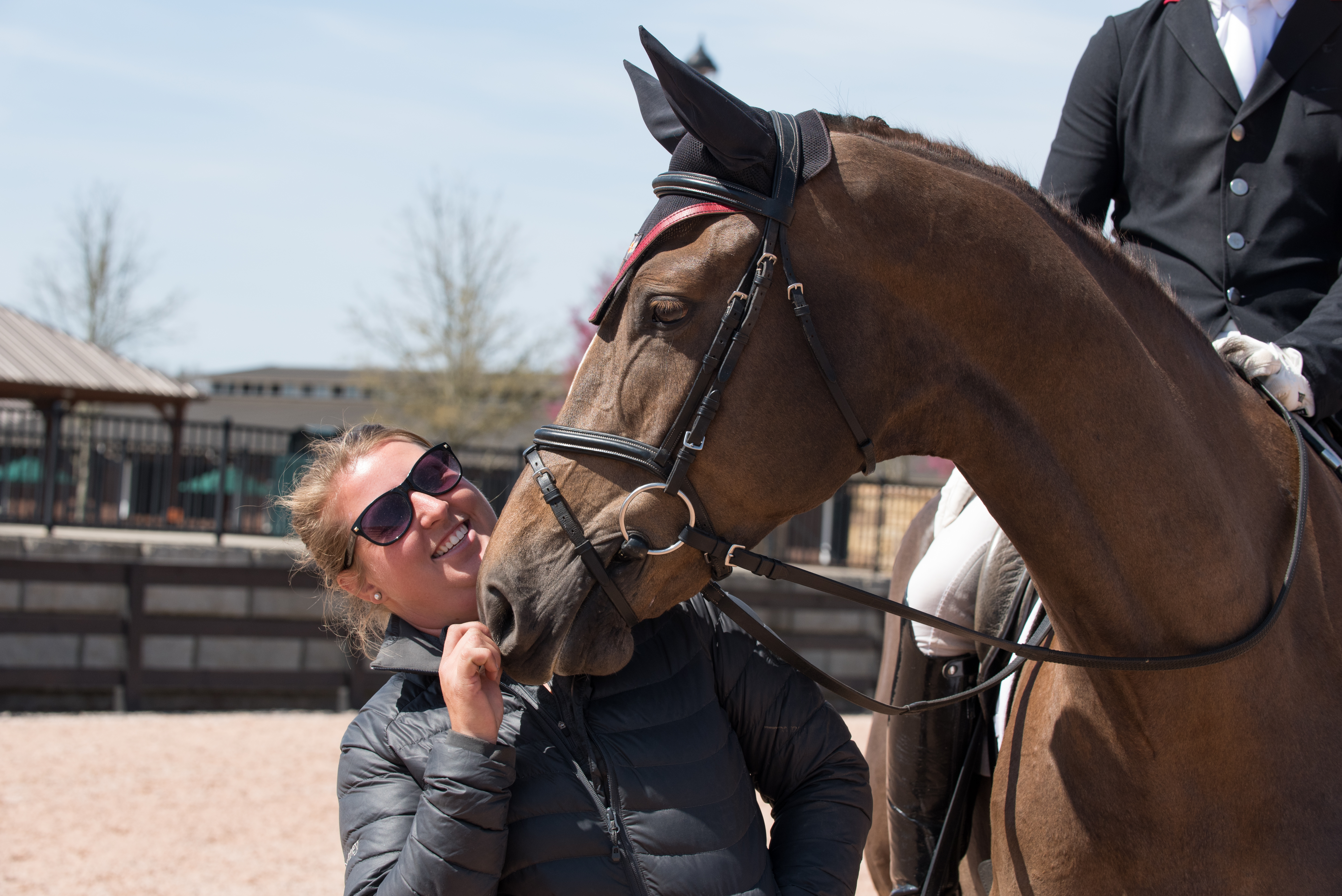
Stressor 1: Changes In Routine
Horses thrive on consistency, and suddenly switching their routine is a surefire way to cause stress. Try to feed grain around the same time every day and keep horses on a regular turnout schedule. Occasional, short-term changes aren’t usually a big stressor for most horses, but stay as close to their normal schedule as possible. If a major change in a horse’s routine is unavoidable, try to make it gradually.
Courtney Carson is a professional groom and barn manager for Doug Payne Equestrian in Aiken, South Carolina. With both eventing and show-jumping horses of all ages and experience levels in her care, she has to keep a consistent schedule not only to complete chores with efficiency but also to make sure the equines in her charge stay healthy.
“[In my experience] the number-one cause of stress is a major change in routine, like if all of a sudden they go from night turnout to only going out for a couple of hours during the day or if the barn goes from being quiet to having a ton of activity,” Courtney says.
The nature of Doug’s training and sales business means that horses are moving in and out of his program frequently. Any time a new horse comes into the barn Courtney’s priority is making sure he stays hydrated, “even if it’s only coming from an hour down the road” to decrease the risk of colic as a result of dehydration.
“Horses going from well water to city water and vice versa might think the new water smells or tastes different, but you can get water into them when they eat,” Courtney says. A new horse’s first several meals will include a mash of wheat bran mixed with plenty of hot water for easy digestion and additional water intake. Typically, this process takes two to three days. For example, the first two meals will be all bran mash, the next two meals will be half bran mash and half grain followed by one more meal with almost the full amount of grain and just a little bit of bran mash. Finally, the horse will receive his normal grain meal without bran.
Courtney also will introduce new horses to the stable’s turnout and training system gradually. Starting with limited supervised turnout with a quiet equine companion gives her an idea of how the new horse behaves in the field. After a couple days, Doug may ride the new horse quietly for only 15 or 20 minutes and slowly increase the workload to assimilate him into his training program.
Stressor 2: Stall Rest
No matter how careful you are, injuries cannot always be prevented. In some cases, a horse may be prescribed stall rest during recovery that can cause significant stress and anxiety due to boredom, loneliness, pain or discomfort from the injury and lack of exercise.
When confined to a stall for an extended period of time, a horse needs to be kept hydrated and on a consistent feeding schedule. Dehydration can cause impaction colic and an inconsistent feeding schedule may upset the intestinal flora that aids in digestion, leading to an increased risk of colic or other digestive problems. A veterinarian may recommend administering a gastric supplement during long periods of stall rest to avoid the development of gastric ulcers.
Stall rest can be frustrating for normally active horses. Preventing boredom can help keep them from developing vices such as pacing and weaving in the stall or becoming depressed or aggressive. Toys such as Jolly Balls are a great way to keep a horse occupied while on stall rest. If you are crafty, you may also make homemade toys for your horse. Fill an empty plastic jug with grain or treats, remove or poke holes in the lid and hang it in the stall with a hay string. He will have fun trying to get the goodies out of the container.
“When we have a horse on stall rest, we try to keep him in a high-activity area of the barn where people are always walking by and can say ‘hi.’ It keeps him interactive. We will also put him where he can see another horse or is next to another horse so he never feels isolated or alone,” Courtney says.
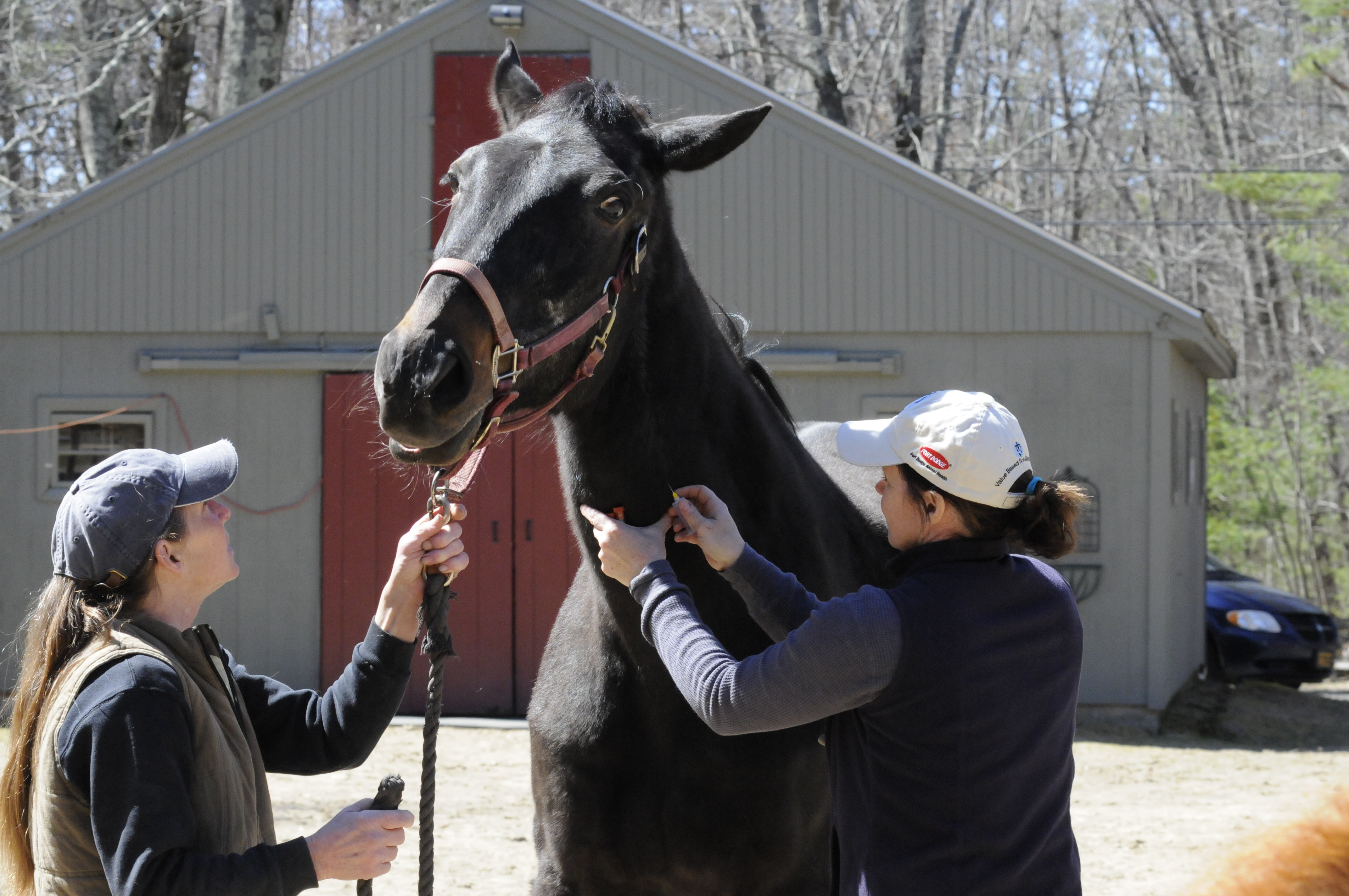
Stressor 3: Vet and Farrier Care
The vet, whose regular visits are necessary to ensure the health and well-being of a horse, isn’t always a welcome visitor. Being poked and prodded during examinations can be intrusive and some horses will come to recognize a vet and have a negative response to her arrival. Similarly, horses may dislike having their feet handled by a farrier for long intervals or the hammering noise and sometimes the smell of hot shoeing while being shod.
Horses who associate stress with vet and farrier visits should be worked with calmly and patiently. “They build on good experiences,” Dr. Wright says.
On the morning of an appointment, Dr. Wright wants to keep the horse’s routine as close to normal as possible. Feed and turn out around the same time and bring your horse in only within the hour of the scheduled appointment.
“If I know they’re going to be stressed by me, I’ll take them into an open area and have my tech handle them for a while before I even come up to them,” Dr. Wright says. Sometimes distracting the horse by offering treats while vaccinating or administering treatment also helps.
Often if an owner has had a bad vet or farrier experience and is anticipating a negative response from the horse, her stress will project onto the animal and make things worse. Sometimes it is productive for the owner to step away altogether and observe from a distance.
Despite appropriate preparation and calm interactions, some horses will still find the vet or farrier to be too much to handle that day. “If it starts going bad, I stop,” Dr. Wright says. “There is nothing that we’re usually doing on those routine appointments that can’t wait.”
Stressor 4: Riding and Training
Studies show regular exercise may reduce a horse’s cortisol levels. However, the high-intensity training and competition schedule of a performance horse or a situation where a horse is working with discomfort may cause the opposite response. Frequent signs of stress while being ridden are chomping or grinding the bit, tail-swishing, excessive sweating and the inability to relax. Over time, this may lead to decreased performance, difficulty with training and the development of gastric ulcers.
All riders want their horses to be happy, compliant partners with a good work ethic, an interest in learning and a successful career. However, it may not be the work itself creating your horse’s stress. An underlying problem could cause discomfort during riding. If your horse seems to be stressed under saddle, here’s a checklist to identify the source.
- Inspect your tack to make sure the saddle and bridle fit correctly and are not causing soreness.
- Have a veterinarian perform a physical exam to check for lameness or discomfort in his body. Consider a massage or soothing liniment bath to relieve sore muscles.
- Check that your horse’s teeth aren’t causing mouth pain.
- Ask your farrier to look for an abscess, ill-placed nail or foot soreness. Were there recent changes in the way the horse was shod? Is your barefoot horse ready for shoes?
If your horse’s physical health checks out and his shoes and tack fit properly, talk to your trainer about what you as a rider can do to reduce stress. Maybe your horse is especially worried when hacking out alone or is tired of working in the confined space of the arena. Could it be that the questions being asked of him are too difficult for his current fitness level?
Stressor 5: Travel
Traveling is one of the most stressful situations for horses. They are not only going to an unfamiliar location, they are usually experiencing a significant change in routine. Depending on your horse’s stress triggers, take steps to ease the anxiety of travel as much as possible.
- Make sure your horse stays well hydrated. Powder or paste electrolytes administered orally encourage him to drink. A bran mash or watered-down meals will also increase fluid intake.
- Give him plenty of access to hay throughout the trip to keep him occupied and keep the gut functioning properly.
- If your horse is accustomed to regular turnout but there is none available, take him for frequent hand-walks to keep him out of his stall as much as possible.
- Talk to your vet about administering a preventive dose of omeprazole prior to traveling. This will reduce stomach acid caused by elevated levels of cortisol and ward off gastric ulcers.
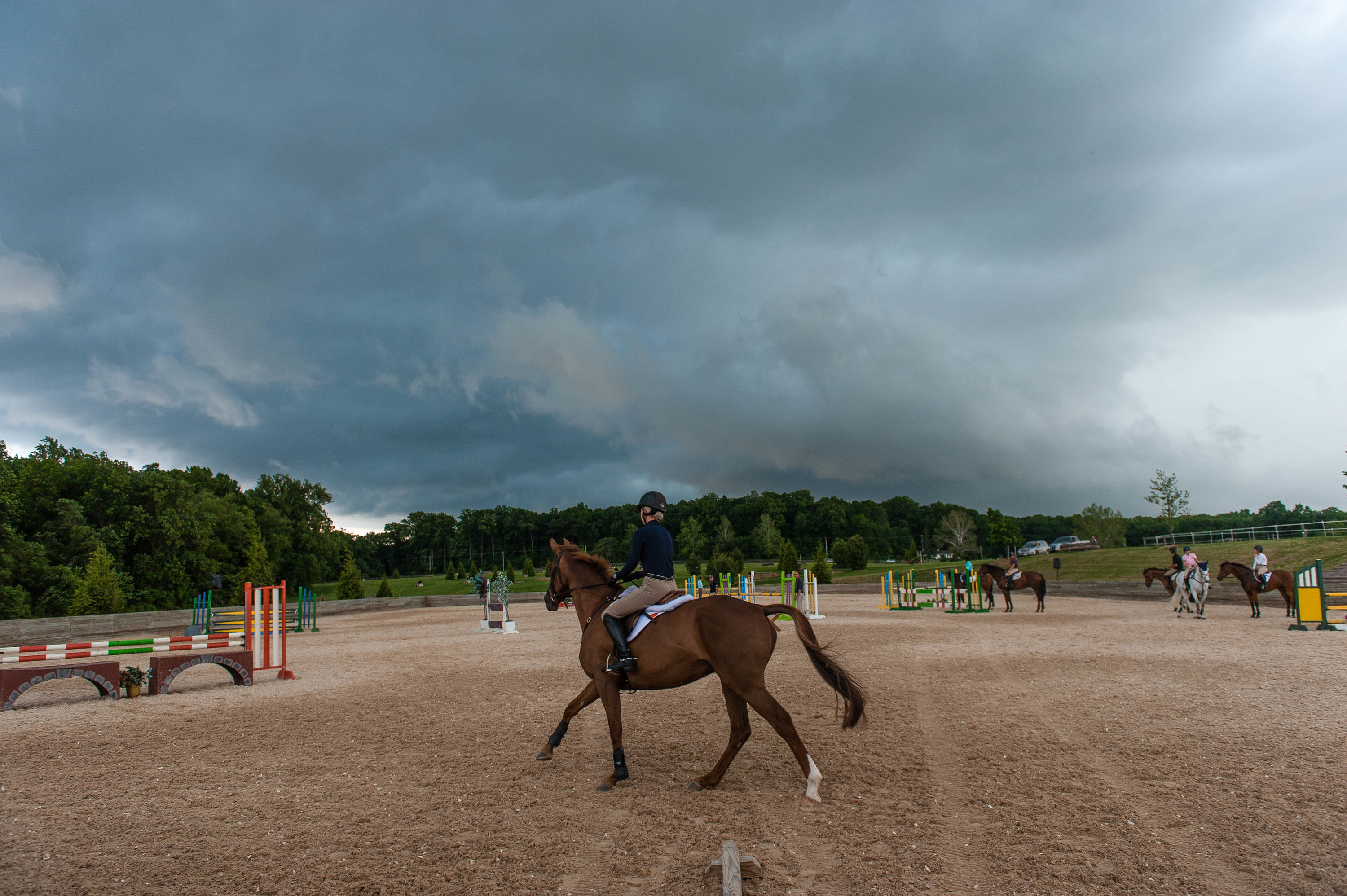
Stressor 6: Weather
Not every stressor is imposed upon horses by humans. Weather is a natural occurrence that can cause stress responses.
From the rise and fall of the thermometer’s mercury reading to a dramatic shift in barometric pressure accompanying incoming severe storms, changes in weather patterns affect some horses. A sudden variation in weather may alter drinking, grazing or exercise habits, leading to gastric distress, dehydration or mild colic.
Horses may have trouble adjusting to fluctuating temperatures (20 to 30 degrees or more) in the course of a single day or week. Keeping an eye on the forecast and planning ahead makes a big difference in preventing weather-related stress.
When it comes to weather, Courtney will add bran mash to the horses’ regular meals. This is not a complete diet change but it does invite them to eat and continue getting water. “I’ll give them bran for three meals a day during a major temperature swing or once a day if the weather is going to be weird all week. Then I try to always keep fresh water and hay in front of them,” Courtney says.
Varying weather patterns are not the only concern. A horse who is too hot or cold is also susceptible to illness. Watch that your horse doesn’t have too much or too little hair for the climate and be careful not to over- or under-blanket in winter.
Stressor 7: Reproduction/Pregnancy
A mare in estrus, or heat, may experience physical discomfort due to the development of a follicle on an ovary or frequent urination—one indication to other horses that she is ready to be bred. Behavioral estrus symptoms also include decreased performance under saddle, difficulty being handled and colic-like symptoms. Consider a treatment such as altrenogest (Regu-Mate) which stops a mare from coming into heat or consult your veterinarian about other available options to reduce estrus symptoms. (Read “To Ease the Stress of Estrus” in the April 2018 issue of Practical Horseman for more about managing your mare’s heat cycle.)
A pregnant mare will experience stress during labor due to the pain of contractions and the birth itself. She may paw, pace, sweat, lay down and get back up many times or bite at her belly in response to discomfort. If she continues to exhibit these signs after foaling, your veterinarian may recommend administering medication for pain relief such as phenylbutazone or Banamine.
Depending on a horse’s personality, environment and routine, he may find many reasons to be stressed. However, good management practices, such as keeping as many aspects of his life as regular and consistent as possible and avoiding sudden changes in routine or diet, will help reduce stress and promote physical and mental health. Dr. Wright concludes, “Make changes and have good experiences compound on each other.”
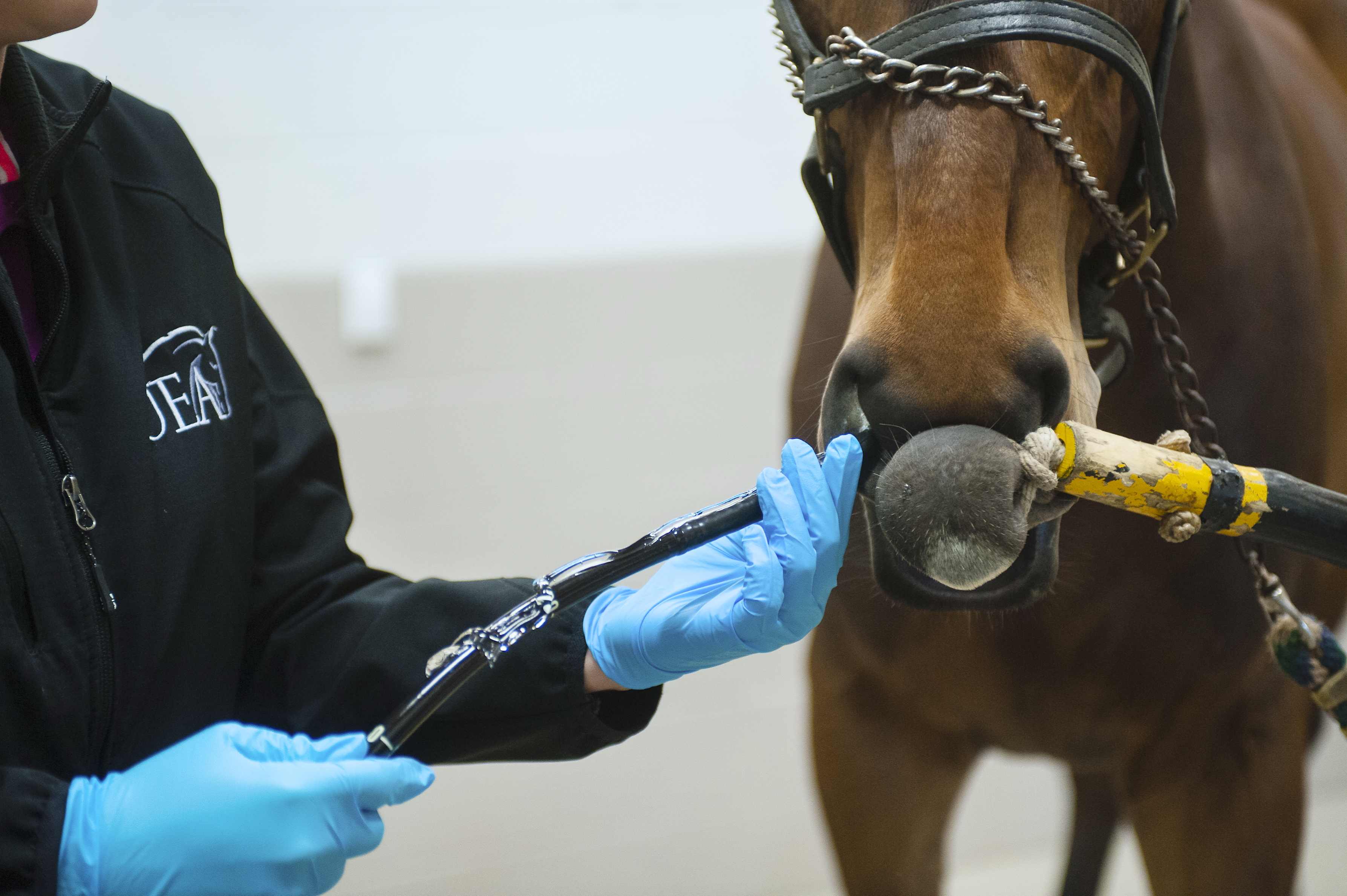
Stress and Gastric Ulcers
Gastric ulcers are a common result of chronic stress and cause a large amount of anxiety for owners. Unfortunately, ulcers often go undiagnosed until the effects become serious. Cortisol, a hormone released by the adrenal glands during stress, reduces the production of the hormone prostaglandin, which then lowers the pH (increases the acidity) of the stomach. In turn, the stomach’s protective mucous lining is less effective and susceptible to damage. The development of lesions (open sores or wounds) on the stomach lining may cause abdominal pain, reduced appetite, colic and poor body condition.
The only way to definitively diagnose gastric ulcers is by passing an endoscope (a flexible tube that allows a veterinarian to see inside the body) through the nose to the stomach. Gastrogard and Ulcergard, whose active ingredient is omeprazole, are the only FDA-approved medications for treatment and prevention of gastric ulcers and work to inhibit the production of excess stomach acid. In addition to medical care, it is also important to attempt to identify the cause of ulcers to avoid recurrence.
With a veterinarian’s recommendation, horses prone to developing ulcers may receive preventive doses of omeprazole prior to exposure to stressful conditions. There are also many daily supplements on the market that claim to reduce stomach acid or act as stomach buffers, coating and protecting the delicate stomach lining. Feed supplements are not subject to FDA testing, therefore, before using one, check with your veterinarian or select a supplement that has peer-reviewed research available to back up its claims.
Stress or Emergency?
Many signs of stress are similar to signs of an emergency situation, including colic-like symptoms, diarrhea or going off his feed. How do you know what is normal stress and what warrants a call to your veterinarian?
According to Ted Wright, DVM, of Cedar Ridge Animal Hospital & Equine Services, a horse with diarrhea should always have his body temperature taken. A combination of runny manure and a fever (101°F or higher for an adult equine) could indicate a serious problem. A horse refusing grain meals or experiencing overt signs of colic should always be reported to a vet.
“Our number-one emergency as horse vets and the leading cause of death is colic. Any signs of colic, such as pawing, looking at the flank, excessive yawning or mouth movements merit a call.”
This article was originally published in the June 2018 issue of Practical Horseman.

